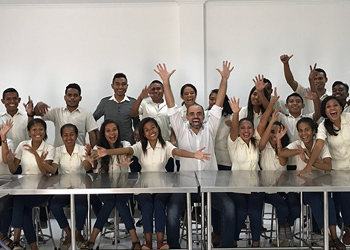Another education in Timor

Letícia Soares never even dreamed of becoming a nutritionist. She wanted to help her country improve its healthcare services when this new study program opened up new opportunities in Timor. Nutrition and Diet, Pharmacy, Biomedical and Laboratorial Science are fields of teaching developed under the auspices of the ForSa Healthcare Training project backed by the Gulbenkian Foundation.
Letícia Soares is to become one of the very first Timorese nutritionists. The young final year student in the first ever Nutrition and Diet course at the Faculty of Medicine and Health Sciences of Timor, a hitherto unknown field but which Letícia embraced as an opportunity to work in health. “Throughout the course, I understood that there was a major lack of professionals in this area and, therefore, I want to help in promoting the health and wellbeing of persons and contributing towards the prevention and treatment of disease”, she explained. Despite the experience acquired along the way, she considers that to become a better professional, she should continue to study. “I want to work in Clinical Nutrition, helping the treatment of patients through their dietary habits”, advanced Letícia. However, she has not ruled out the areas of teaching, training and scientific research.
These new study programs were set up under the auspices of ForSa, a project involving the Calouste Gulbenkian Foundation, Camões IP and the National University of Timor Lorosae, with the objective of improving the pedagogical and organisational capacities of the Faculty of Medicine and Health Sciences of Timor, especially through opening the new fields identified as national priorities. An enormous challenge across various different facets but that the Gulbenkian Foundation representative responsible for technical assistance provides an “extremely positive” balance given that the Faculty is about to produce the first graduates in these fields in the country. Pedro Catarino highlights how the Nutrition and Diet and the Biomedical and Laboratorial Science degrees are the only such programs for professionals in Timor.
Holding the first ever Open Day at the faculty turned out to be one of the most defining of the events held last year. Pedro Catarino said that following the extension of the activities to the community, secondary school students were able to learn about these study programs. The Open Day also enabled the upgrading of the baccalaureate programs to undergraduate degrees “to gain a high rate of success”.
One of these successful courses was Pharmacy that is now into its second edition and which the Timorese authorities attribute great relevance to given the major shortage of human resources in this field. The future pharmacist, Rosita Guterres, does not have any doubts about highlighting the fundamental nature of this training and the issue of controlling the quality of drugs and medicine in Timor. The student deemed training in this field to be “very important to ensuring the efficiency and security of medication”. At the end of her degree, she wants to work in support of diagnosis and promoting the rational usage of medication.
One year in Timor
Pedro Catarino spent the year of 2017 in Timor technically consulting the board of the Faculty of Medicine and Health Sciences in terms of organising and running the new programs as well as a professor of bio-pharmacy and toxicology. A challenge that also stems from the differences with western culture in a country where Portuguese is far from commonly used and practiced. As the professor said, there was frequent “recourse to basic language in Portuguese, and reducing the speed of talking, as well as recourse to English, better understood than Portuguese”.
The structure of the University, the different ways of working and the climate – average temperatures in the region of 30ºC and relative humidity of 90 per cent or more – are some of the factors that stand out in a country and in “a people whose kindness is also a mark of difference”. And he gives an example referring to how, a few days after having arrived in the country, it was lunch time and he was at the University entrance and a group of students that he did not know invited him to lunch. “According to them, I seemed sad and tired and so they offered me lunch”, he described.
Pedro Catarino considers that he has been having a highly enriching human experience, referring to the fact that the Timorese display a lack of attachment to material goods and prioritise family relationships, both with the living and with their already deceased relatives. A genuine “lesson in life”.
